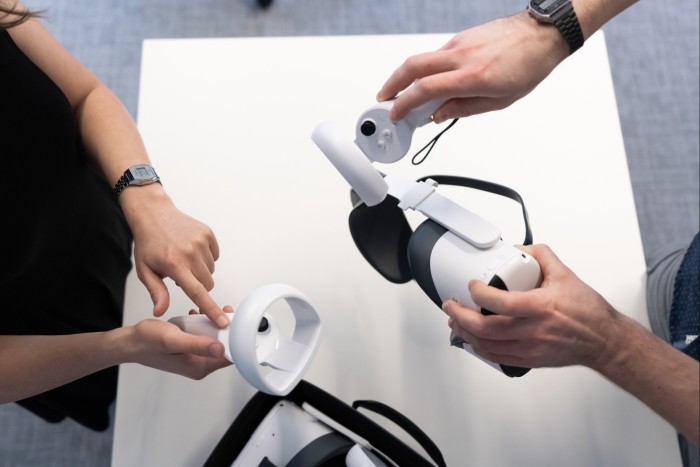Courses in the metaverse struggle to compete with real world

Roula Khalaf, Editor of the FT, selects her favourite stories in this weekly newsletter.
The Vienna University of Economics and Business (WU) has offered a tantalising prospect to people who want to learn but don’t like to leave the house: join us ‘virtually, for a postgraduate course in the metaverse.
Students signing up to WU’s professional master of sustainability, entrepreneurship and technology programme can complete the entire part-time course — attending lectures, meeting their classmates for a coffee and so on — by just logging in via a laptop.
The course — developed in partnership with Tomorrow University of Applied Sciences, an edtech start-up based in Berlin — is one of many examples where business schools have embraced the metaverse, 3D technology, virtual reality headsets and avatars to extend the reach of management and leadership training.
Setting up the course “provides us with greater reach, making the course more global”, explains Barbara Stöttinger, dean of WU’s executive academy. However, she is quick to add: “Vienna is a great location so coming to campus is still pretty attractive to most of our students”.
FT Online MBA ranking 2022 — 10 of the best

Find out which schools are in our ranking of Online MBA degrees. Learn how the table was compiled and read the rest of our coverage at ft.com/online-learning.
And this is the problem at the heart of why many business schools have been reluctant to enter the metaverse for course tuition: studying in the real world has its advantages.
Teaching the interpersonal skills of leadership and networking that are so integral to postgraduate management courses, like the MBA, is better done in person. It also avoids having to fund purchases of the hardware and software necessary for metaverse projects.
Meanwhile, the metaverse has been caught in an extreme example of a ‘hype cycle’. This is where wild enthusiasm about a new technology turns to widespread rejection, as its reality fails to live up to what is claimed for it.
It first burst into the public consciousness a couple of years ago. The key moment was when Facebook renamed itself Meta “to help bring the metaverse to life”, at a time when online multiplayer video games were very much in vogue.
Subsequently, though, enthusiasm for the metaverse has waned at a surprising rate. Indeed, criticising the metaverse is becoming as popular a pastime now as praising it was in its early days.
Meta chief executive Mark Zuckerberg has even felt forced to say that the metaverse is “not the majority of what we’re doing”. And reports in February indicated that Microsoft had decided to close its “industrial metaverse” project only a few months after starting it.
But because business schools do not operate at the same speed as the technology industry, many are still at the stage of testing out metaverse concepts. In some cases, they have been seeking partnerships with technology companies in gaming and virtual reality to help build teaching platforms.

“Meta is investing billions of dollars in this and gaming is a $200bn industry but, in education, we don’t have those kinds of budgets,” says Steve Muylle, associate dean of digital learning at Vlerick Business School in Belgium. “Part of the problem is that the technology is constantly evolving. So, even if you did invest, the hardware and software quickly moves on.”
Vlerick is part of a global alliance of business schools interested in developing online teaching techniques, known as the Future of Management Education (FOME). It is currently working with a local gaming company to develop a virtual teaching environment for Vlerick students, enabling it to offer masters students the level of graphics they might expect from playing immersive multiplayer online computer games while keeping costs down.
“We have to offer people a wow experience in the metaverse,” Muylle argues. But part of the problem, right now, is that masters students may be “underwhelmed” by the relatively basic quality of the graphics offered by virtual learning applications, he admits. This is especially the case for gamers that are used to Massive Multiplayer Online Games, where the virtual environment is not only hyper-realistic, but also perpetual — so that players can leave and return again to find the action has moved on.
Another FOME member is London’s Imperial College Business School. It has just begun a pilot of virtual reality systems for the Working in Diverse Organisations module that all of its 2,000 masters students must take as part of their degree courses.
A group of 20 students is testing kit provided by London-based tech start-up Bodyswaps, enabling them to role-play situations as avatars, where a fellow student or tutor says something inappropriate about someone else’s ethnicity or gender. The students can see how they are perceived by others by watching back the recording and seeing their avatar’s reaction.
“It is really quite challenging because you see yourself and your body language,” says Sarah Grant, a leading member of Imperial’s edtech team. “I am confident that we will find that it is useful. But I want to look at the evidence before we invest in a roll out.”
Grant’s comments reflect a concern that students might be excited by virtual reality headsets and avatars because they are a novelty, only for their usefulness to diminish wane as the excitement wears off.
It is important “to engage with this and see whether there is anything significant to do in this area beyond the hype”, Grant says. “I think that investigation is still under way.”
Comments